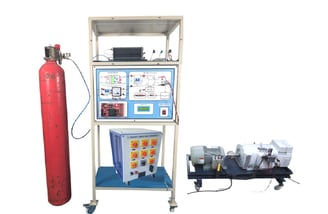Fuel cell based EV Emulator Research System
dynamic simulations of fuel cell connected to EV motor
Introduction to PEM Fuel Cell-Based Electric Vehicle
Proton Exchange Membrane (PEM) fuel cells offer a promising alternative to traditional lithium-ion battery-powered electric vehicles (EVs). These fuel cells generate electricity through an electrochemical reaction between hydrogen and oxygen, producing only water and heat as byproducts, making them an environmentally friendly power source.
Unlike batteries, fuel cells provide continuous energy as long as fuel is supplied. However, due to their relatively slow dynamic response, a supercapacitor is integrated into the system to provide instant power during rapid load changes. This hybrid approach enhances the system’s efficiency, responsiveness, and longevit


System Configuration and Connection Diagram
The fuel cell-based EV emulator system comprises the following components:
PEM Fuel Cell: Serves as the primary energy source.
Supercapacitor Bank: Enhances power response and stabilizes transient loads.
DC-DC Converter: Manages power flow between the fuel cell and the supercapacitor bank.
EV Converter: Regulates power from the supercapacitor to the EV motor.
EV Motor: Represents the propulsion system of an electric vehicle.
Torque Sensor & DC Motor: Simulates vehicle loading by applying variable loads on the EV motor.
sbRIO Controller: Governs the entire system, ensuring precise control and real-time monitoring.
LabVIEW Application Platform: Provides user interface and operational control for the system.
Operation of the System
Power Generation: The PEM fuel cell generates DC power by converting hydrogen into electricity through an electrochemical reaction.
Power Management: The output of the fuel cell is directed through a DC-DC converter to regulate voltage and current before being stored in the supercapacitor bank.
Instantaneous Power Response: The supercapacitor bank compensates for the slow dynamic response of the fuel cell, providing instant power when required.
EV Propulsion: The regulated power is supplied to the EV motor through an EV converter, simulating real-world driving conditions.
Load Simulation: The EV motor is coupled to a DC motor via a torque sensor. The DC motor acts as a load to simulate vehicle road conditions.
Regenerative & Non-Regenerative Loading: The system supports both regenerative (where energy is fed back into the system) and non-regenerative (where energy is dissipated) modes as per client requirements.
Control & Monitoring: The entire system is controlled via an sbRIO controller with a user-friendly LabVIEW interface for data monitoring and real-time adjustments.
Applications
EV Development & Testing: Enables researchers and manufacturers to evaluate fuel cell-based EVs under different loading conditions.
Renewable Energy Integration: Helps in designing hybrid power systems incorporating hydrogen and renewable energy sources.
Education & Research: Serves as an advanced training platform for students and professionals in the field of electric mobility and power electronics.
Industrial & Defense Applications: Can be adapted for special-purpose vehicles requiring high efficiency and sustainability.
Research and Customization Points
The DC-DC and EV converters are controlled via software, making them customizable for various operational needs.
The supercapacitor sizing can be optimized for different vehicle power profiles.
The system supports different load profiles, allowing users to simulate various driving conditions.
Software-based customization of power flow enables researchers to test various energy management strategies.
The integration of fuel cell to EV using control algorithms can be explored to optimize system performance.
This fuel cell-based EV emulator system presents a highly adaptable and scalable platform for the advancement of hydrogen-powered electric mobility solutions.
Contact Us for Fuel Cell based EV Emulator Research System
Reach out to us for any questions or inquiries about our sophisticated wind turbine emulator system. We are here to assist you with hardware-level simulations and more.
Get in Touch
02975-356173
Message
info@matview.co.in
